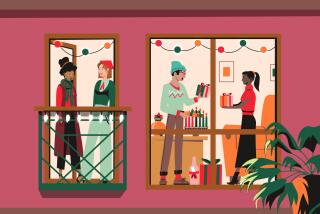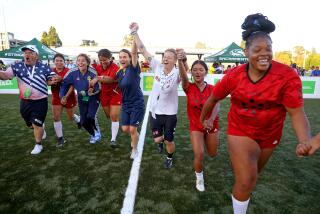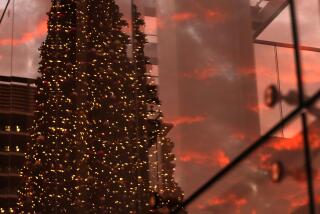Culver City gallery owner gives crutches to Sierra Leone disabled
- Share via
As a Culver City art gallery owner and marketing and advertising executive, Lisa Schultz wondered whether there was anything she could do about the plight of disabled men, women and children in Sierra Leone.
Many had lost limbs during unspeakable atrocities during that African country’s devastating civil war, and others suffered injuries or were born with birth defects. But all felt the stigma of being immobile in a country where the disabled are often kept behind closed doors.
“Crutches,” she remembers thinking. “What if we found a way to get them crutches?”
Schultz, 46, is now in Sierra Leone celebrating World Peace Day by distributing 10,000 pairs of crutches to the disabled. She has yet to figure out a way to pay for all the crutches. So far, she has raised just over half of the $250,000 she needed to fund Operation Rise, as she dubbed it.
“I’m on the hook for the full amount,” she said shortly before flying to Sierra Leone. “But I’m trying to have faith that it will all work out.”
Schultz had little awareness of Sierra Leone and was simply going about the business of running her art space, Gallery 9, when she came across a book of photographs of Sierra Leone’s celebrated amputee soccer team.
The team was made up of men who had lost limbs in the civil war. And yet, the images by Spanish photojournalist Pep Bonet were uplifting, inspiring and life-affirming. Compelled to delve deeper into the story behind the photographs, Schultz learned more about the challenges facing the disabled in that country and said she felt a calling to help. The result is the Peace Project, which is dedicated to finding ways to help children around the globe, and its first major initiative is Operation Rise.
“At first, I was like ‘This is crazy, what can I do to help people halfway around the world?’” she said. “But then I realized, ‘Hey wait a second, I can do something here.’”
Schultz said working with Sierra Leone is deeply satisfying because there is a palpable sense of hope and optimism, and a unifying desire to move the country forward after years of civil unrest. “You don’t have the same factional divides as in other countries,” she said. “People are leaving the past in the past.”
The country is relatively small, and rich in natural resources, factors that can also make change possible, she said. “I believe, as many others do, that with some smart aid, Sierra Leone could really serve as a model for how to come back from a terrible conflict and really become a vital, dynamic country.”
But first, you have to get the people moving.
Each set of crutches costs about $25 — a relatively modest gift by U.S. standards. But it will forever transform the lives of recipients, said Mahimbo Mdoe, a UNICEF representative who is assisting Schultz in Sierra Leone.
“For these people, it will mean they are able to move around,” he said, adding that it will allow men and women to hold jobs, while children will be able to get to and from school. “To the person who gets a pair, it will be everything.”
Mdoe added that Schultz is a bit of a curiosity in Sierra Leone. Residents are grateful for her assistance, and almost puzzled by it. “People are just flabbergasted at what she is doing here,” he said. “They cannot believe it. They think it’s very generous.”
Schultz says it is her life that has been changed by her work with Sierra Leone, and not only because she is in the process of adopting a 9-year-old boy and already thinking about what her next project there will be.
“My perspective has really changed,” she said. “I’ve never had to skip a meal because I haven’t had money. And if I’m going to spend hard-earned money on anything these days, it’s going to be helping these people.”
More to Read
Sign up for Essential California
The most important California stories and recommendations in your inbox every morning.
You may occasionally receive promotional content from the Los Angeles Times.














